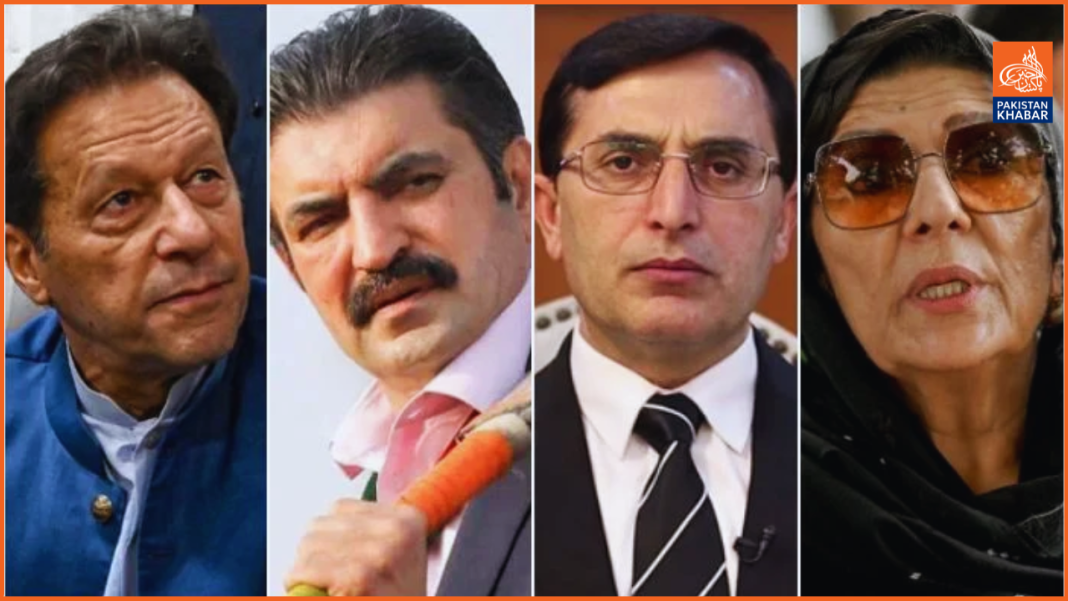As doubts cloud the future of the ongoing dialogue between Pakistan Tehreek-e-Insaf (PTI) and the government, conflicting statements from PTI leaders about the alleged “offer of Imran Khan’s house arrest” have complicated the situation further.
On Tuesday, Aleema Khan, the sister of PTI founder Imran Khan, claimed that the proposal originated from Khyber Pakhtunkhwa Chief Minister Ali Amin Gandapur. However, PTI leaders Barrister Gohar Ali Khan and Sher Afzal Marwat offered conflicting perspectives on the matter.
Marwat, a vocal PTI leader and lawyer, stated that the house arrest proposal came from the establishment and the government through Interior Minister Mohsin Naqvi, but was rejected. He further revealed that after the rejection, an alternative proposal was made to release Imran Khan either after three weeks or by December 20, again communicated through Naqvi. Marwat explained that the tragic incident on November 26 during PTI’s “do-or-die protest” in Islamabad had altered circumstances and led to the initiation of talks with political leadership. He acknowledged that the establishment had maintained occasional contact but clarified that there had been no backdoor negotiations since November 26.
In contrast, Barrister Gohar insisted that there had been no discussions about transferring Imran Khan to Bani Gala or any proposal for his house arrest. In a phone call with Geo News, he emphasized that neither the government, Naqvi, nor the establishment had engaged in any talks about the PTI founder’s release, house arrest, or transfer.
Aleema Khan, speaking to the media after meeting her brother in Adiala jail, revealed that offers for deals had been made “since the beginning,” though no direct contact had occurred. She confirmed that Imran Khan was offered house arrest at Bani Gala, and that this proposal came from Gandapur. Aleema argued that if her brother had wanted to strike a backdoor deal, he would have done so long ago, expressing frustration that such an offer was being made after over a year of Imran’s imprisonment.
Aleema Khan also expressed skepticism about the motivations behind the negotiations, reiterating that Imran’s two demands remained unchanged: the formation of a judicial commission to investigate the events of May 9 and the release of prisoners. She criticized the lack of response to these demands, lamenting that the negotiation committee had been unable to meet with the PTI founder.
She further highlighted the importance of judicial commissions in democracies, asserting that Imran Khan has always championed these principles. She also accused certain individuals within the government’s negotiation team of “stealing our mandate” and criticized the lack of transparency, suggesting that there was talk of deals and agreements being made behind the scenes.
Imran Khan, who has been imprisoned since August of the previous year following his conviction in the Toshakhana case, remains a central figure in the political landscape. His release continues to be a long-standing demand of PTI, and after months of political tensions, the party and the coalition government began negotiations to de-escalate the situation. PTI’s initial demands have included the release of Imran Khan and all political prisoners, as well as a judicial inquiry into the events of May 9 and November 26.
Despite these vocal demands, PTI has not yet shared its charter of demands in writing with the government committee. The negotiation process has reached a deadlock, with PTI leaders being denied permission to meet Imran Khan by Adiala jail authorities. The government has cited PTI’s failure to present written demands as the reason for not proceeding with further meetings.




